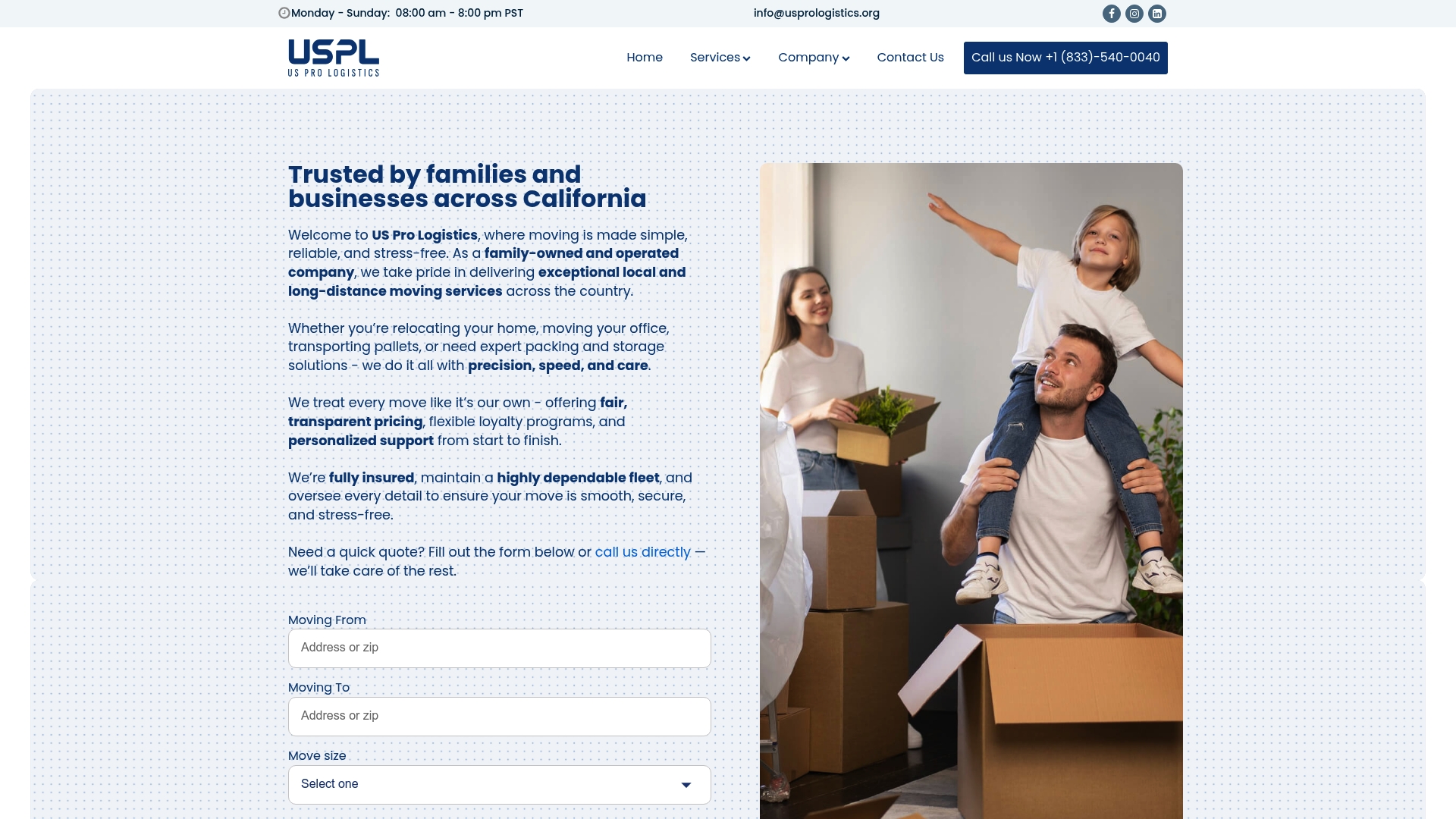
Moving from one home to another is stressful for anyone. Now imagine if you rely on a wheelchair or other mobility device and your move suddenly becomes a puzzle with dozens of new risks. But most moving companies just use one-size-fits-all services and hope for the best. Disability moving assistance takes a completely different route, offering specialized support that addresses everything from medical equipment and accessibility to emotional well-being. The difference can mean going from overwhelming chaos to a safe, personalized relocation that actually makes independence possible.
| Takeaway | Explanation |
|---|---|
| Disability moving assistance enhances personal independence | Tailored support allows individuals to transition confidently, reducing dependency on caregivers and fostering personal growth. |
| Specialized planning addresses individual mobility needs | Comprehensive assessments create customized strategies that ensure safe and comfortable relocations for those with disabilities. |
| Professional training ensures dignity and respect | Moving personnel receive training focused on disability sensitivity and effective communication, making relocations smoother and more respectful. |
| Support systems foster societal integration | By facilitating relocation, these services empower individuals with disabilities to engage more fully in community and work life. |
| Comprehensive solutions encompass emotional and logistical support | Disability moving assistance goes beyond transport; it includes emotional care and practical help in navigating transitions. |
Disability moving assistance represents a specialized and critical service designed to support individuals with physical, cognitive, and mobility challenges during relocation processes. These comprehensive services go beyond standard moving solutions by providing tailored support that addresses unique needs, ensuring safety, comfort, and dignity throughout the moving experience.
Disability moving assistance encompasses a holistic approach to relocation that recognizes the complex requirements of individuals with diverse abilities. Unlike traditional moving services, these specialized solutions focus on creating a personalized transition strategy that considers physical limitations, sensory needs, medical equipment transportation, and emotional support.
Key components of disability moving assistance typically include:
The critical nature of disability moving assistance cannot be overstated. According to the World Bank, accessible transportation and support services are fundamental in reducing social and economic isolation for individuals with disabilities. These services do more than simply transport belongings - they facilitate independence, preserve dignity, and create pathways to new opportunities.
For many individuals with disabilities, moving represents more than a logistical challenge. It involves navigating complex physical and emotional transitions that require nuanced understanding and professional support. Disability moving assistance transforms what could be an overwhelming experience into a manageable, respectful process that prioritizes individual needs and comfort.
By offering specialized support, disability moving services ensure that individuals with diverse abilities can transition between locations with confidence, safety, and minimal stress, ultimately promoting greater personal autonomy and quality of life.
Disability moving assistance services are intricate systems designed to provide comprehensive support for individuals with varied mobility and accessibility requirements. These specialized services extend far beyond traditional moving solutions, creating holistic approaches that address physical, emotional, and logistical challenges faced by people with disabilities during relocation.
The foundation of effective disability moving assistance lies in thorough professional assessments. Trained specialists conduct comprehensive evaluations that consider an individual’s specific mobility needs, medical requirements, assistive technology dependencies, and potential environmental challenges. These assessments form the cornerstone of creating customized moving strategies that prioritize safety, comfort, and individual autonomy.
Key elements of professional assessment include:
Unique moving requirements demand specialized equipment and technical expertise. According to the Administration for Community Living, disability moving services must provide advanced technological and physical support mechanisms. This involves custom transportation solutions, specialized lifting and transfer equipment, and sophisticated handling techniques for medical devices and mobility assistive technologies.
Critical technical support components encompass:
Perhaps the most critical component of disability moving assistance is the human element. Moving professionals undergo extensive training in disability sensitivity, communication techniques, and specialized handling protocols. This training ensures that every interaction is conducted with profound respect, understanding, and professional competence, transforming a potentially stressful experience into a dignified, supportive transition.
By integrating professional assessments, specialized technical support, and comprehensive personnel training, disability moving assistance services create a holistic approach that goes beyond mere transportation, instead offering a compassionate, personalized relocation experience that preserves individual dignity and promotes independence.
Disability moving assistance represents a nuanced service framework designed to address the diverse and complex requirements of individuals with varying physical, cognitive, and sensory capabilities. Unlike standard moving services, these specialized solutions recognize that each person’s disability journey is unique, requiring personalized, compassionate approaches that respect individual autonomy and specific functional needs.
Physical mobility challenges demand comprehensive and adaptive moving strategies that go beyond basic transportation. Individuals using wheelchairs, walkers, or requiring assistive devices need moving services that provide specialized equipment, trained personnel, and meticulous planning to ensure safe and comfortable transitions.
Key support mechanisms for mobility impairments include:
Moving can be particularly overwhelming for individuals with cognitive disabilities, autism spectrum disorders, or sensory processing challenges. According to the National Center for Mobility Management, transportation services must incorporate strategies that minimize sensory overload and provide predictable, structured support.
Support strategies for cognitive and sensory needs encompass:
Individuals with complex medical conditions or requiring specialized medical equipment need moving assistance that goes beyond physical transportation. These services must integrate medical expertise, precise equipment handling, and comprehensive logistical planning to ensure uninterrupted care and medical continuity.
By recognizing and responding to the intricate spectrum of disability experiences, moving assistance services transform relocation from a potential source of stress into an empowering, dignity-preserving journey. The ultimate goal is not just physical transportation, but facilitating smooth life transitions that honor each individual’s unique capabilities and needs.
To highlight the different aspects addressed by disability moving assistance, the table below compares how these services support various types of needs during relocation.
| Support Area | Key Service Features |
|---|---|
| Mobility Impairments | Wheelchair-accessible vehicles, specialized lifting equipment, mapped accessible routes, trained handling |
| Cognitive & Sensory Disabilities | Pre-move orientation, visual aids/social stories, quiet environments, ongoing communication and support |
| Medical & Complex Care Needs | Medical device handling, custom equipment transport, coordination with medical professionals, care continuity |

Securing disability moving assistance involves a comprehensive, multi-step process that prioritizes individual needs, ensures comprehensive support, and creates a personalized relocation strategy. This systematic approach transforms what could be an overwhelming experience into a structured, supportive transition that respects individual autonomy and unique requirements.
The foundation of disability moving assistance begins with a thorough initial assessment, which involves gathering detailed information about an individual’s specific mobility, medical, and accessibility requirements. This critical first step allows moving professionals to develop a comprehensive understanding of the unique challenges and support needs associated with the relocation.
Key documentation and assessment components include:
Following the initial assessment, moving specialists develop a tailored moving strategy that addresses specific functional requirements. According to the Federal Transit Administration’s Section 5310 program, this process involves creating personalized transportation and support solutions that go beyond standard moving services.
Critical planning elements encompass:
The final stage of securing disability moving assistance involves executing the customized moving plan with precision, sensitivity, and comprehensive support. This phase requires close collaboration between the individual, their support network, medical professionals, and moving specialists to ensure a smooth, dignified transition.
By implementing a structured, empathetic approach, disability moving assistance transforms relocation from a potential source of stress into an empowering journey that prioritizes individual dignity, safety, and independence. The process is not merely about physical transportation, but about creating a supportive pathway that honors each person’s unique capabilities and needs.
This table organizes the primary steps involved in securing disability moving assistance, clarifying the responsibilities and focus at each key stage of the process.
| Process Stage | Main Activities and Focus |
|---|---|
| Initial Assessment | Evaluate medical history, mobility, equipment, and location accessibility |
| Customized Service Planning | Develop tailored strategy, plan equipment needs, coordinate medical/logistical support |
| Implementation & Ongoing Support | Execute move with trained personnel, continuous support, monitor safety and comfort during transition |
Disability moving assistance transcends traditional transportation services by creating comprehensive support systems that fundamentally transform life experiences for individuals with diverse abilities. These specialized services represent more than logistical solutions - they are pathways to independence, dignity, and personal empowerment.
Disability moving assistance directly contributes to expanding personal autonomy by providing tailored support that enables individuals to navigate life transitions with confidence. These services break down physical and systemic barriers that traditionally limit mobility, creating opportunities for personal growth and self-determination.
Key independence-enhancing benefits include:
According to the World Bank’s accessibility research, specialized moving assistance plays a critical role in breaking cycles of social isolation. By facilitating seamless transportation and relocation, these services enable individuals with disabilities to more actively participate in community life, employment, and social interactions.
Societal integration advantages encompass:
Beyond immediate transportation needs, disability moving assistance generates broader economic and personal development benefits. These services create multiplicative effects that extend far beyond simple point-to-point movement, enabling individuals to pursue career opportunities, access essential healthcare, and maintain meaningful social connections.
By addressing comprehensive mobility challenges, disability moving assistance transforms fundamental life experiences. The service is not merely about physical transportation, but about creating inclusive pathways that honor individual potential, respect personal dignity, and support holistic human development across multiple life domains.

Navigating a move with disability-related needs can feel overwhelming. Many face challenges like ensuring accessibility, safe medical equipment transport, and compassionate handling at each step. If you are wondering how to secure a moving experience that truly respects your mobility, medical, and personal requirements, you are not alone. At US Pro Logistics, we transform every detail of disability moving assistance—from accessibility assessments to personalized support plans—into a smooth, dignified journey. To explore a complete range of solutions and gain reassurance that your unique circumstances will be honored, visit our main service hub.

Let our specialized team deliver comfort, reliability, and peace of mind for your next transition. Act now and discover why so many choose US Pro Logistics when moving with complex needs. Start by visiting the full category overview for more information or to request your personalized quote. Your new home and a brighter tomorrow are only a click away.
Disability moving assistance is a specialized service designed to support individuals with physical, cognitive, and mobility challenges during relocation. It provides tailored support to ensure safety, comfort, and dignity throughout the moving experience.
Services typically include accessibility assessments of both current and destination locations, custom equipment handling for mobility devices, trained personnel, and individualized moving plans that cater to specific physical and cognitive requirements.
Disability moving assistance addresses varying needs by providing specialized support for mobility impairments, cognitive and sensory disabilities, and complex medical conditions, ensuring that each individual’s unique requirements are met throughout the moving process.
The process includes an initial assessment to evaluate specific mobility and medical needs, followed by customized service planning that outlines tailored moving strategies, and finally, implementation with ongoing support to ensure a smooth transition.
USDOT 3664256 This number is required for any company that operates commercial vehicles in interstate commerce (across state lines). It helps identify and track the safety performance and compliance of transportation companies.
MC 1268070 This number is specifically for companies involved in the transportation of goods or passengers for hire across state lines. It’s necessary for carriers operating in the moving industry and ensures they are authorized to operate as interstate carriers.